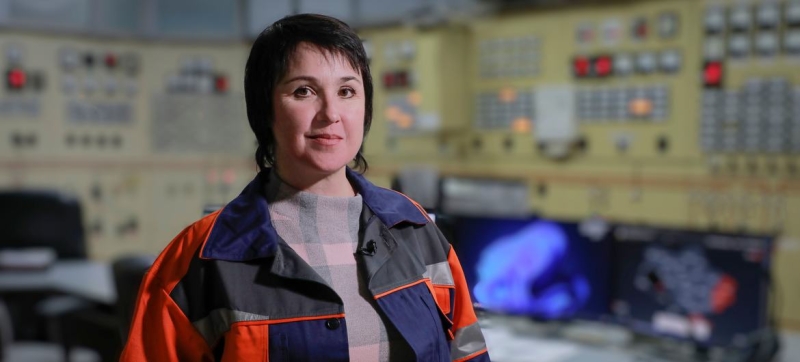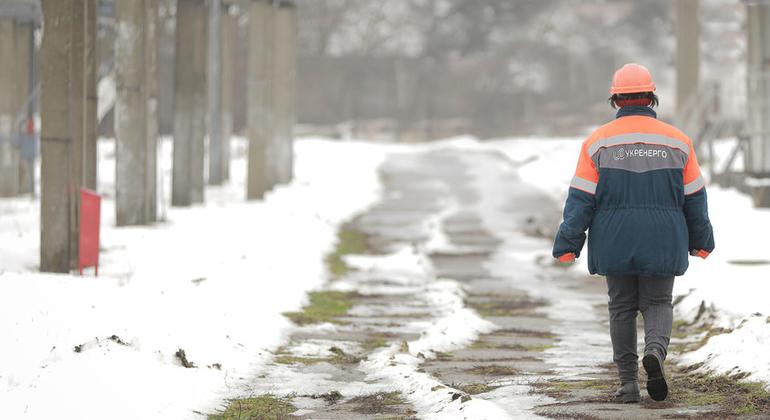
Elena Vaskovskaya at her workplace. Bringing light to people despite everything: the story of a Ukrainian energy engineer Peace and Security
Before the full-scale invasion, Elena Vaskovskaya worked at the Lisichansk substation for eight years. After the start of a full-scale war, she was transferred to the Donbass substation, where she repeatedly came under fire, hid in the basement and even took exams – also during shelling. In May 2022, she was transferred to the operational control group, in a safer area. In a conversation with representatives of the United Nations Development Program (UNDP), Elena recalls the most terrible and dangerous moments she experienced since February 24, 2022.
“Hello, Elena! Why is there no electricity?”
“I come from a family of power engineers, born in the city of Severodonetsk. My father worked as an engineer at a factory, after which he became the chief power engineer of an agricultural enterprise. Mom was a high-voltage network engineer. Therefore, love for energy is in my blood. After graduating from high school, I attended a vocational school and received a qualification as an electrician in the maintenance and repair of electrical equipment.
My job is that I monitor the operation of substation equipment. If an emergency occurs, the dispatcher must resolve it as quickly as possible so that people have heat and electricity in their homes. In order for the equipment to work stably and uninterruptedly, it must be repaired. In addition, the dispatcher’s job is to ensure that repair crews have safe access to the equipment.
As soon as we lose power, I hear: “Hello, Elena! You don’t know why the lights were turned off?”
I answer: “Yes, I know!”
“And when we have electricity?”
I answer that the light will appear when the emergency situation is eliminated.
At the Lisichanskaya substation
On February 24, 2022, I had to go on shift. At 7 am the boss called and said: “Don’t go to work. The war has begun.” I said: “How is it? We have a night shift there. I need to replace them.” Since then, we have worked according to the principle “we work 24 hours, rest 24 hours.”
Then massive shelling began and power lines were damaged. There was no electricity. And what is important for people in the first place? Light, warmth…
What is important for people in the first place? Light , warm…
When the shelling subsided, we began to supply electricity to consumers through reserve lines. We went out into the street, stepping carefully, because there could be mines on the ground. At work I managed to somehow hold on, but at home everything inside was shrinking, and I could not breathe calmly. Because of my worries, I lost seven kilograms in two weeks.
I went to work with a backpack that had enough food to last me two days because I didn’t I knew how long I would have to stay there. I remember collecting mobile batteries from people in the basement, where up to 200 people were hiding, and taking them with me to work to charge them.
Soon after this, not only critical infrastructure, but also civilian objects began to come under constant fire. My house was hit five times. Soon after this it turned out that I left the city.

At a substation in Donbass
One day my boss called me and said: “ There are vacancies at the Donbass substation. They don’t have enough staff. Do you want to work there?”.
I agreed almost immediately. But for a long time I was tormented by a feeling of guilt because I left the Lisichansk substation.
I arrived at the new place in early May and worked there for almost a month. During this short time, I learned to distinguish the sounds of shelling: where everything was coming from and where it was flying. I had already heard some of these sounds at home.
In order to fully perform my duties at the Donbass substation, I had to pass a remote exam. I was at the substation, my boss was next to me. At this moment, one of the most powerful attacks on Bakhmut began. The shells hit the substation and I heard an explosion. A nearby residential building was damaged.
Did I pass the exam? Yes.
“We worked until the last minute”
We worked at the substation until the last minute – until they fired at the bus that was taking people to work. Fortunately, no one was hurt – except the bus itself. After that, our boss said that he couldn’t risk people’s lives, and everyone was evacuated. No one works there anymore.
Before the full-scale invasion, we went to work as if it were a holiday. We knew that any situation could be resolved. There were planned switchings and planned work.
Now we make decisions quickly, no matter what the circumstances, because the full operation of electrical equipment and the power supply of the entire system depend on us. But the most important thing is the people. We bring them light and have no right to give up.”
